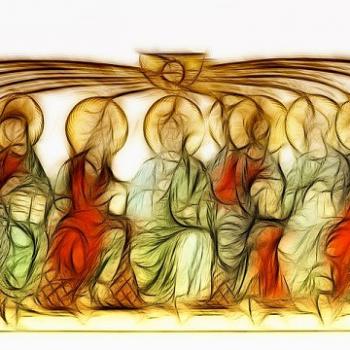In my General Ethics class, my students and I have just finished a three week unit on race issues. Although the college I teach at has made great strides toward diversifying the student body and faculty over the past decade, this particular class reminds me of how much more work there is to do. Of my twenty-five students, only two are persons of color–the rest are as white as I am. Accordingly, I began our considerations of race and related issues a few classes ago by sharing an illuminating experience that I had not long ago–at Walmart, of all places.

If I lived by my principles fully, I would never shop at Walmart. For reasons too numerous to belabor, Walmart represents many of the worst features of American capitalism. But there are many items that Jeanne and I regularly purchase at Walmart, items that we could get at any number of other retail establishments. So why do we go to Walmart? Because it’s convenient and its cheaper. Principles be damned, apparently—I guess there’s an American capitalist in me after all. But I must confess that I don’t enjoy going there—I feel as if I’m doing something wrong every time I pull into Walmart’s parking lot.
My latest excursion to the Walmart dark side was a few Saturdays ago, shopping for dog treats, a few cheap picture frames, checking the Keurig display (our Walmart occasionally has our favorite Amaretto flavor), shampoo, cold medicine, and a couple of other items for which in our experience Walmart has the lowest prices. After paying I headed for the exit where, as is the custom at this Walmart, there was an employee checking the bags of those leaving the store for the parking lot—something that Jeanne and I both find annoying and yet another reason to hate Walmart. Then something happened that I found worthy of a Facebook post when I got home.
Had an interesting experience at Walmart this morning. After buying my stuff and heading for the exit, there’s a Hispanic family in front of me and an African-American guy behind me. After checking the receipt of the family in front of me to make sure everything is accounted for, the Walmart employee at the door (an older white guy) waves me through. I said “No, either you check everybody or you check nobody.” Checking my receipt, he said “you’re right.” In the parking lot afterward, the guy behind me said “thanks, man–that was nice.”
This was not a typical thing for me to do; my awareness usually is only high enough to show the employee my receipt if she or he insists and get the hell out of there. But this time I noticed something and, contrary to my nature, said something about it. “Good for me,” I congratulated myself as I drove home.
White privilege—I confess that although I read about it frequently and have intellectually affirmed that it exists for a long time, in practical terms I have been virtually blind to it. Jeanne and I have laughed occasionally that there are no two whiter people in the world than we are. I have white hair in a ponytail and white skin that is a product of my Scandinavian gene pool. Jeanne acts Italian, but has the beautiful, freckled lily-white skin from the Irish half of her ancestry. Without Jeanne’s red hair we would look like Casper and his significant other.
But over the past few years my sixty-plus-year-old whiteness has come to my attention more frequently than in the past—I hear and read over and over again that certain elements of U. S. citizenry is angry, upset about all sorts of things, an anger that is making outsiders such as Donald Trump attractive in spite of their complete lack of traditional qualifications for the Presidency. And what sorts of people are angriest? Older white people, particularly older white guys. My demographic, in other words.
So what are older white people angry about? According to an older white couple interviewed by MSNBC recently, “everything.” When asked to be more specific, neither one of them went further than “we want America to be the way it used to be,” in alignment with Trump’s slogan “Make America Great Again.” The attractiveness of that, of course, depends on how one defines “great”—as one of the anchors on “Weekend Update” on Saturday Night Live remarked, “Whenever rich old white guys start bringing up the good old days, my Negro senses start tingling.”
Specific issues are often raised, but the general sense is that a segment of the population—particularly older white folks—have a gnawing fear that things they have taken for granted their whole lives are changing and that the world they thought they could depend on seems not quite so dependable any more. There is anger that a world which used to make perfect sense isn’t making sense any more. One blunt but honest way of describing this is that older white folks aren’t happy about an emerging world in which whiteness and entitlement are no longer synonymous.
I was surprised that my brief Facebook post about my Walmart experience received more “likes” and comments than anything I have ever posted on Facebook—and I’m pretty active there (more than I should be). My experience apparently hit a nerve—positively. One Facebook acquaintance whom I have never met in person commented “Not only is it great that you pointed this out at the time, but it is great that you posted about it. Too many of us white people aren’t even aware that this happens . . . probably partly because we aren’t even aware that ANYONE gets checked . . . when it doesn’t happen to us, we don’t notice.”
It takes conscious awareness for the privileged to even see their privilege—this is why “All Lives Matter” from a white person is not an appropriate response to “Black Lives Matter.” This response implies that “of course black lives matter—we all do, because everyone is equal in our country. Didn’t you know that?” Ignoring, of course, the fact that older white folks like I are the beneficiaries of generations of accumulated and embedded privilege our whole lives, usually without our even being aware of it. It can be jarring to be told forcefully that what we take for granted has been institutionally denied to those unlike us throughout the history of our country.
As is often the case, this experience also causes me to consider my commitment to following Jesus. The Jesus I grew up with was white, his disciples were white, as was everyone in my world. All of this, of course, is undoubtedly false–but the color of Jesus’ skin, or anyone else’s, should be beside the point. There’s nothing in the gospels that specifies such surface level characteristics as even worthy of our notice as we seek to bring the love and inclusiveness of Jesus into the world. Recognizing that the world I’m trying to do this in is often fractured by and infected with discrimination and intolerance should be a reminder of just how important–and radical–the message of the gospels actually is.
I’m not an angry older white person—even if I shared the fears of those who express such anger (and I don’t), I would not be able to sustain it for long. Being perpetually pissed takes a psychological toll. But as an older white person I am privileged in ways that are both institutional and unjust—I commit myself to noticing and addressing those ways as often as possible. As a close friend commented on my Facebook story, “I love those moments which move life toward justice—one has to believe that it all adds up.” One bit of awareness at a time.













